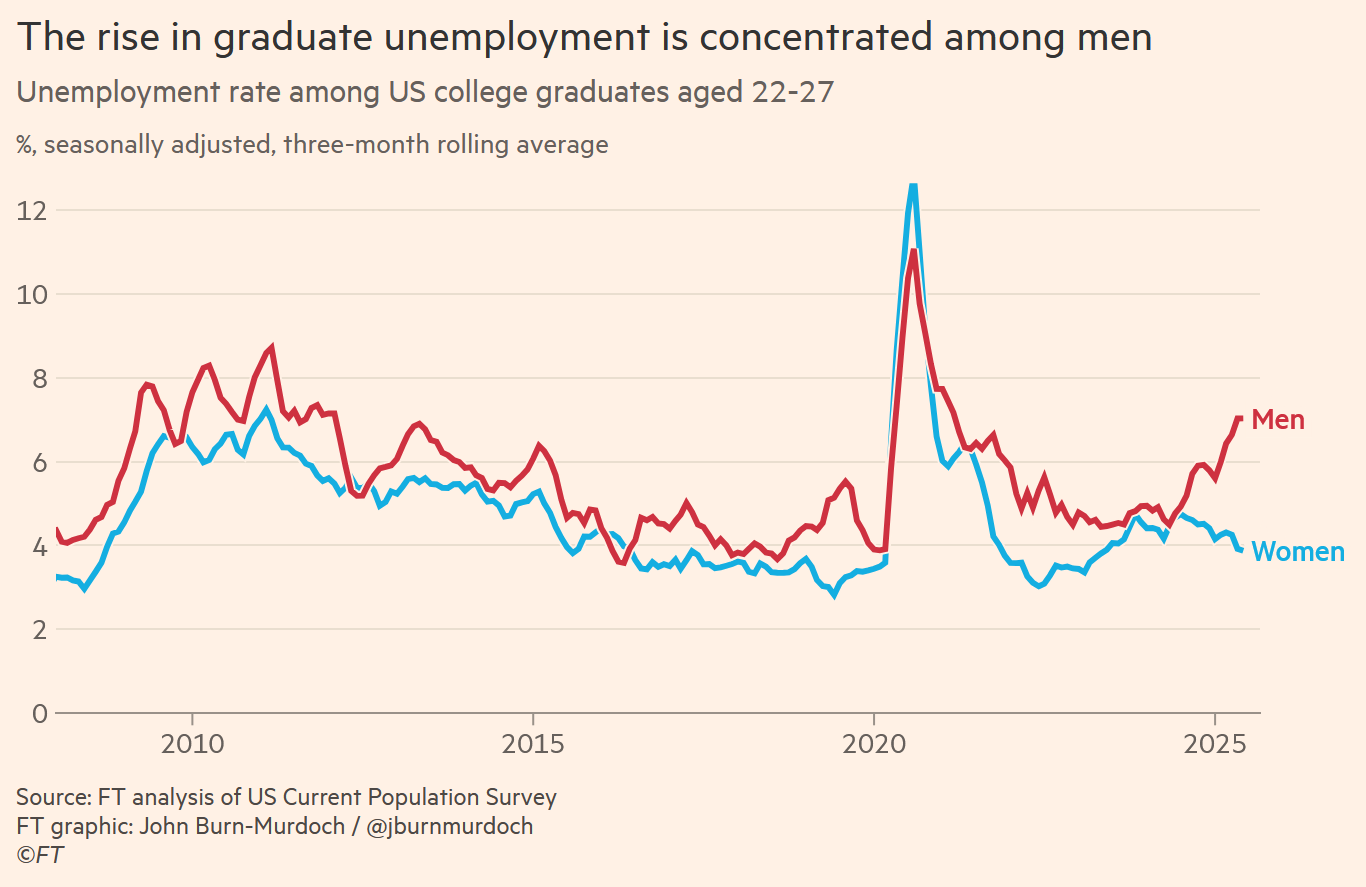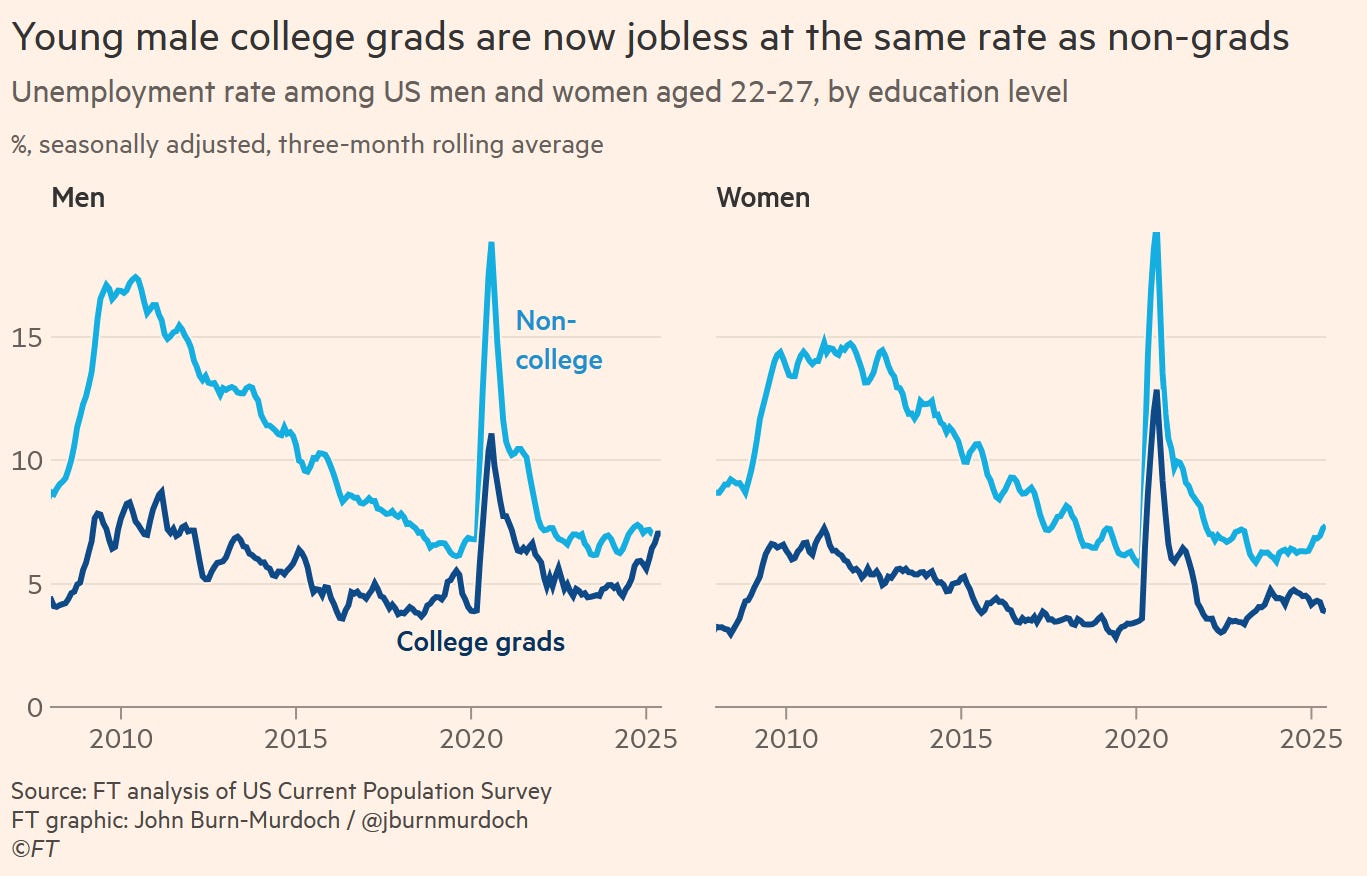Weekly Grounding #104
News, links, writing
Weekly Groundings are published every Friday to highlight the most interesting news, links, and writing I investigated during the past week. They are designed to ground your thinking in the midst of media overload and contribute to Handful of Earth’s broader framework. Please subscribe if you’d like to receive these posts directly in your inbox.
If you’re already subscribed and want to help the publication grow, consider sharing Handful of Earth with a friend.
“Trump and MAGA Are No Longer the Same Thing”
At The Financial Times, Janan Ganesh reflects on the recent friction between Donald Trump and his base: “All these tiffs will pass. But each one exposes an important truth: Trump and Maga are no longer the same thing. His movement—the intellectuals, the donors, the more online of the grassroots—have intense beliefs. Besides a life-long conviction that running a current account deficit with another nation constitutes ‘losing,’ he doesn’t.”
Ganesh continues: “[W]e can now see what the future of the US right looks like. Unless the Republicans find another version of Trump—someone whose star power overwhelms all philosophical reservations about him or her—the next leader will have to be more in tune with the movement. That is, more Christianist, more nationalist, more paranoid. An extreme rightwinger can put up with half a loaf under Trump because he provides so much else in dazzle and tribal leadership. You aren’t getting that with JD Vance. Ideological and even personal litmus tests, which have been waived for Trump, could return. In other words, we have to entertain the notion that Trump is a moderating influence on a movement that will become much more doctrinal once he is gone. He approaches the world through personal relations, which are malleable, not ideas, which aren’t.”
In my January 2025 article, “Elon Musk and Vivek Ramaswamy's Assault on the American People,” I argued that “MAGA populism has a life independent from Trump.” I suggested that “If Trump continues to abandon his populist base in favor of his newfound right-wing progressive donors, it is unclear where these populists will turn. But this much is clear: they will remain a pivotal force in American politics with or without Trump.”
“The Great Un-Awokening”
Meanwhile, the Democratic Party, still floundering in the wake of the 2024 election, finds itself at odds with its own base on key issues. Adam Wren and Elena Schneider report at Politico: “Searching for a path out of the political wilderness, potential 2028 candidates, especially those hailing from blue states, are attempting to ratchet back a leftward lurch on social issues some in the party say cost them the November election…On diversity, equity, and inclusion, some in the party are also sending a signal they’re no longer kowtowing to their left flank. Former Transportation Secretary Pete Buttigieg removed his pronouns from his social media bio months ago, and questioned how the party has communicated about it.”
The article reports that “Adam Frisch, the former congressional candidate and director of electoral programs at Welcome PAC, said his party is ‘out of touch culturally with a lot of people. I think a lot of people are realizing, whether you’re running for the House, the Senate, or the presidential, we better start getting on track with what I call the pro-normal party coalition,’ Frisch said. ‘You need to focus on normal stuff, and normal stuff is economic opportunity and prosperity, not necessarily micro-social issues.’
Whereas these “micro-social issues” are central for much of the Democratic Party’s base, it appears that they were nothing but an opportunistic performance for many of the Party’s leading figures. The article notes that Gavin Newsom, “the liberal former mayor of San Francisco,…has also distanced himself from so-called woke terminology and stances. The governor claimed earlier this year that he had never used the word Latinx,’ despite having repeatedly employed it just years earlier and once decrying Republicans who’ve sought to ban the gender-neutral term for Latino.”
“The Struggle Over AI in Journalism Is Escalating”
Speaking of Politico, the outlet’s journalists are currently in conflict with management over the role of AI at the publication:
reports at Blood in the Machine: “In early 2024, after nearly two years of negotiations, the PEN Guild ratified its first collective bargaining agreement. And that contract contained some very straightforward guidelines about the use of AI: Notably, that if Politico’s management wants to introduce new AI products that ‘materially and substantively’ impact journalists’ job duties, it needs to give 60 days notice. For [an] AI summarizer, Politico’s bosses gave its editorial staff 60 minutes instead…On July 11th, the PEN Guild took Politico’s management to arbitration over assertions that it had violated the AI provisions in the union contract it agreed to just last year.”Merchant continues: “Less than a week later, Mathias Döpfner, the CEO of Axel Springer, the parent company of Politico, Business Insider, and many other media outlets—it’s Europe’s largest publisher—issued a mandate for every one of his employees to use AI. In a long, impassioned speech, the executive explained that it was now an expectation, not a suggestion, that every journalist at Politico, E&E News, Business Insider, and his other media properties use AI in their work. ‘Nobody in the company has to explain in the company why she or he is using AI to do something—whether to prepare a presentation or analyze a document,’ he said, according to media reporter Oliver Darcy. ‘You only have to explain if you didn’t use AI. That’s really something you have to explain because that shouldn’t happen.’ Döpfner added that, ‘We would never say this article was made with the help of AI. We always use all sources of information, and in the future more and more AI.’”
The PEN Guild’s moderate and disarming tone on AI, however, may render its resistance efforts too little too late: “Guild members say they’re not against AI—just that they want the technology used in line with Politico’s editorial values, and in a way that benefits their work instead of harming it. They began circulating a petition titled ‘Tell POLITICO Management: AI should work with journalists, not against us!’”
“Humans Out Of The Loop”
On the topic of AI,
reflects on the trajectory of the technology at : “Today, there is still human agency at work. We still have a say in how the future unfolds, and there is a single political choice that governs all of this: the choice to continue researching, training, and advancing Artificial Intelligence. We could make laws to stop doing so. We could put bans or moratoria in place. We could enact pauses. We could proceed but within the parameters of international treaties. We are doing none of these things, and that is, indeed, a problem of our own creation. But the longer we wait, the more irrelevant we will become to the course of events.”He writes that “AI is going to destroy jobs not because anyone necessarily wants them destroyed, but because it will render those jobs superfluous. That’s the very purpose of its creation. Its existence alone will compel these harms, whether or not corporate executives and politicians are on board. This is not just a political problem, and it will soon no more be a matter of our choosing than natural disasters or the spread of viruses are…As AI agents proliferate, employers will stop hiring entry-level workers. The entry-level workers they already have will either lose their jobs or will be promoted into junior positions as their former jobs are filled by AI. One can frame this as a ‘political’ choice but it’s really not a choice at all. Firms will simply be forced by competition to adopt the new practice.”
Woodhouse argues that “It may be the case…that at the present time, corporations are making socially destructive but profit-maximizing decisions and then pointing the finger at AI. But as agentic AI progresses, these explanations will no longer be mere excuses. Certainly the C-Suite executives don’t wish to see their own positions replaced. As their boards force them out in the face of AI-induced hyper-competition, it will become clear that these processes are no longer being driven by human interest or initiative, even that of the most powerful among us. They will be driven by the requirements of the technology itself, which by that time will be wholly alienated from us and will, indeed, constitute an actual mystical force, one that is beyond both our control and our comprehension.”
“Rising Graduate Joblessness Is Mainly Affecting Men. Will that Last?”
At The Financial Times, John Burn-Murdoch reports that the “marked rise in unemployment among recent college graduates has been one of the most-talked-about economic trends of the past year. Joblessness among highly educated youngsters everywhere from the US to the UK and beyond has climbed above the overall unemployment rate for the first time on record, raising questions about everything from the value of a college education to the role played by AI.”
He argues that this “headline trend masks important nuances beneath the surface, which, once unpicked, shed light on the extent to which these sweeping narratives are true. Digging into detailed monthly US employment data, the first thing that jumps out is that the rise in graduate joblessness is concentrated almost entirely among young American men. The unemployment rate for recent male graduates has risen steeply from less than 5 per cent to 7 per cent over the past 12 months. For young female graduates in the US, joblessness is unchanged over the same period, if not falling slightly.”
“Most striking of all, recently graduated young men are now unemployed at the same rate as their non-graduate counterparts, completely erasing the college employability premium.”
What explains this remarkable data? “Almost 50,000 of the 135,000 additional jobs filled by young women graduates in the past year were in America’s healthcare sector—more than double the total number of additional jobs going to graduate men across all sectors over the same period. Rising demand from an ageing population, coupled with relative resilience to automation, appears thus far to be making healthcare a steady ship in choppy water. Perhaps ‘learn to care’ could replace ‘learn to code’ as the go-to career advice for the next generation.”
Burn-Murdoch concludes that, “while young women appear to be doing better at navigating the current ructions in graduate labour markets, there is no reason to think this will continue to be the case. Recent US research finds that women are, if anything, at slightly higher risk of occupation displacement from generative AI than men, and if AI does start to displace junior white-collar roles on a significant scale, women’s much higher participation in higher education could leave them especially exposed. Partners at law and consulting firms may still skew male, but the junior ranks of the same firms are mostly staffed by women. And while hands-on healthcare occupations are likely to be safe from automation, that is far less obviously true for back-office roles. Today, the erosion of the graduate employment premium appears to be an especially acute concern for men. But rather than think of this as a sex-specific problem, policymakers would be wise to consider the implications of this pattern playing out more broadly.”
“Meet the New MAGA Girlies”
Some young women, however, have their sights set on other career paths.
reports on her trip to the Clare Boothe Luce Center’s annual leadership conference for Unherd. The conference “for young women promises to nurture ‘strong, conservative leaders’ and help ‘young women flourish… while strengthening their families, communities, and country.’ With more than 120 there, this was its biggest gathering yet.”Isaacs writes: “Clad in what I thought was my smartest outfit—white shirt, black trousers, ballet flats—I realized my miscalculation the moment the elevator doors opened. Before me stood Mia, 21, from North Carolina, in a long white dress and stilettos, her curls immaculate. It was a sea of voluminous blowdries and meticulous makeup. Nearly every girl was dressed as if she was about to meet a senator, or marry one, while I looked like the Senate librarian.”
“In this room, femininity wasn’t something to rebel against or escape from, but something to inherit and slightly refashion, like your mom’s old wedding suit,” Isaacs continues. The girls identified as ‘first-wave feminists,’ because they weren’t looking for equality, but a way to make peace with everything they’d been told to seek. Here, the pursuit of love didn’t conflict with ambition, nor was faith at odds with intelligence.
“Yet…there were holes in the story of conservative womanhood these girls were being sold. ‘Tradwife or Girlboss, maybe you don’t have to choose,’ read one of the conference’s ads; and in many ways, the movement on offer here felt like a soft-lit inversion of the girlboss era, with self-empowerment refashioned as political purpose. Where the girlboss promised liberation through self-branding, the conservative woman here was encouraged to become her fullest self by serving others, her God, her country, her family. Yet both models offered the same tired bargain: perform perfectly, and you’ll be rewarded.”
What grounded your thinking this week? Share in the comments.





The Leighton Woodhouse notions are worth paying attention to over time. Note that his initial assertion is that there exists public policy reasons for regulating AI. But then he concludes that human agency itself is on the chopping block. The better metaphor is dissolving tank. Policy makers always adhere to profitability rationale for their legislative decisions. Market is God - in whom we are commanded by money to eternally trust. Therefore, advocating for regulation of AI is a self-canceling pursuit. “You can’t stop progress” is ever applicable, as post hoc “knowledge” animates the cognoscenti in perpetuity. See for example, Brett Weinstein’s discovery of the fact that informing the government that you want to be an organ donor can get you killed.